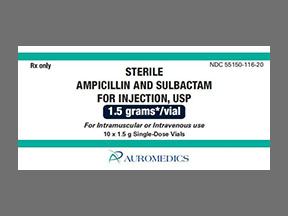
Unasyn Coupons & Savings Card – Discount Prices from $1.01
Brand for: Ampicillin-sulbactam
My prescription
Edit
1.5 (1-0.5)GM, Ampicillin-sulbactam (1 Solution Reconstituted)
Select pharmacy

CVS
$23.12
COUPON PRICE
Walmart
$1.01
COUPON PRICE
Walgreens
$7.37
COUPON PRICE
Albertsons
$7.45
COUPON PRICEUnasyn savings card
Show this card to your pharmacist
Walmart
$1.01
BIN
ID
PCN
GRP
019876
LH02F01846
CHIPPO
LHX
Powered by
Related penicillin antibiotics prescriptions
More prescriptions for sinus infection
Related penicillin antibiotics prescriptions
More prescriptions for sinus infection
Unasyn (Ampicillin-sulbactam) dosage forms
Dosage Quantity Price from Per unit 1.5 (1-0.5)GM 1 Solution Reconstituted $1.01 $1.01 1.5 (1-0.5)GM 10 Solution Reconstituteds $16.57 $1.66 3 (2-1)GM 1 Solution Reconstituted $1.01 $1.01 3 (2-1)GM 10 Solution Reconstituteds $19.70 $1.97
| Dosage | Quantity | Price from | Per unit |
|---|---|---|---|
| 1.5 (1-0.5)GM | 1 Solution Reconstituted | $1.01 | $1.01 |
| 1.5 (1-0.5)GM | 10 Solution Reconstituteds | $16.57 | $1.66 |
| 3 (2-1)GM | 1 Solution Reconstituted | $1.01 | $1.01 |
| 3 (2-1)GM | 10 Solution Reconstituteds | $19.70 | $1.97 |
What is the drug UNASYN used for?
Unasyn is used to treat a variety of bacterial infections. It is a combination antibiotic containing ampicillin and sulbactam, which works by stopping the growth of bacteria.
Is UNASYN the same as Augmentin?
UNASYN and Augmentin are not the same. UNASYN is a combination of ampicillin and sulbactam, while Augmentin is a combination of amoxicillin and clavulanate. Both are antibiotics used to treat bacterial infections, but they contain different active ingredients and may be used for different types of infections.
Is UNASYN only IV?
Unasyn is available in both intravenous (IV) and intramuscular (IM) forms.
Is UNASYN a strong antibiotic?
Unasyn, which is a combination of ampicillin and sulbactam, is considered a broad-spectrum antibiotic. It is effective against a wide range of bacteria, including those that produce beta-lactamase enzymes, which can make some bacteria resistant to other antibiotics. Its strength and effectiveness depend on the specific type of infection and the susceptibility of the bacteria involved. A healthcare provider can determine if Unasyn is appropriate for a particular infection.
Is UNASYN the same as Amoxicillin?
Unasyn and Amoxicillin are not the same. Unasyn is a combination antibiotic that contains ampicillin and sulbactam, while Amoxicillin is a single antibiotic. Both are used to treat bacterial infections, but they have different compositions and may be used for different types of infections.
